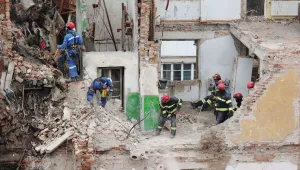CAMBRIDGE, Massachusetts—The publication in July of "Travails of the European Raj" by Gerald Knaus and Felix Martin is a timely analysis of the current Bosnian democratic deadlock and the shortcomings of international regulation.
Within a few weeks, the important issues raised by these two authors were further discussed by think-tanks, such as the International Crisis Group (ICG), and thoughtful observers of Southeastern European affairs, such as Valery Perry, Florian Bieber, and Christophe Solioz.
The debate, however, has fallen short of discussing the real issues at stake. Conspicuously absent are Bosnians themselves, and there is little discussion about the reactions of local politicians, intellectuals, and civil society activists. Most of the talk is centered on well-intentioned foreign observers.
And there is no conclusive way out of what the ICG has called "the paradoxes of state-building"— the building of democratic state institutions in Bosnia via the non-democratic, paternalistic, and dangerously subjective decisions of international bureaucrats.
As it stands, then, the current debate is quite sterile and destined to be quickly forgotten.
Knaus and Martin — and, in general, critics of the international community and High Representative Paddy Ashdown, who leads the civilian peace-building mission and has extensive powers to impose decisions and sack popularly elected local politicians — denounce Bosnia’s democratic stalemate.
The high representative’s powers and attitude resemble those of a colonial governor whose 21st century "white man’s burden" is to make decisions, keeping in mind the well-being of the "Bosnian people," but without being in any way accountable to them.
Advocates of foreign intervention are quick to counter that, rather than being an obstacle to democracy, the high representative’s assertive style is the only way to get the job done.
Local politicians, in fact, disagree constantly amongst each other, and many of them are either inept, or more or less openly opposed to making decisions that could jeopardize their standing within their own respective ethnic communities.
The tragedy of the Bosnian conundrum is that both critics and advocates of international intervention are correct. Imposing decisions on the local political parties creates a dubious "democracy by fiat." At the same time, however, the dire state of local politics suggests that the quick withdrawal of international powers could have potentially dangerous consequences.
Granted there is no panacea to the problems the country continues to face, but a good starting point is a dispassionate analysis and evaluation of what international organizations have done and the impact of their work in the eight years of post-settlement peace-building.
The question is not simply whether Bosnia needs less international regulation and more local democracy, or more international regulation and less democracy. The question instead is, given the objective constraints on the ground — corruption, the lack of an elite worthy of such status, high unemployment, and the continuing domination of nationalist parties — what have international organizations done and why has their work barely scratched the surface?
CURE BEFORE DIAGNOSIS
A diagnosis is a precondition to finding a cure. The patient, however, is as much Bosnia as it is the myriad of international organizations, which have been working in the country for almost a decade but whose effectiveness and positive impact on the ground cannot be simply assumed.
The first striking characteristic of the Bosnian peace-building mission is the absence of any standard by which the performance of international agencies should be judged and evaluations carried out. An obvious starting point is the implementation of the Dayton Peace Agreement that in late 1995 ended the war. But even this apparently straightforward document is not too helpful.
There are provisions in the agreement that have been simply ignored, such as the creation of a fund to compensate Bosnians for the loss of their property. At the same time, there are plenty of internationally driven activities that go beyond Dayton, such as re-starting the economy, reforming the judiciary, the educational system, and public administration, and organizing conflict-resolution seminars, among other things.
Paddy Ashdown’s self-imposed agenda focuses on "jobs and justice." While none of these activities are either "good" or "bad," they raise one important question: When will the peace mission be implemented and completed?
When I posed that question to various international officials both in the capital of Sarajevo and in rural areas in the summers of 2002 and 2003, the range of answers I received suggested that the "peace boat" is navigating without a compass.
For some, the peace mission will be over when Bosnia "enters Europe," for others when the economy improves, and for still others when the high representative says so.
International organizations also too often change their priorities. If the job to be done lacks clarity, the peace operation becomes a patchwork of disjointed events and projects that operate each according to their own logic and short-term needs. But what criterion justifies and guides their existence? Which reforms does Bosnia really need and why?
The Organization for Security and Cooperation in Europe (OSCE), for example, created an Education Department in 2002, opening itself up to the criticism that either the department is too late to have a serious impact on fostering return by providing acceptable school curricula for the returnees, or that international organizations are dealing with an issue that is beyond their mandate — there is no mention of education in the Dayton Agreement — and only perpetuates domestic dependence.
The OSCE also invested many resources between 1996 and 1998 in civil society programs. After five years of near total neglect, the organization has again hired an established American lobbyist to re-develop the civil society program.
There is even a newly created United Nations-affiliated environmental program whose primary task is to have Bosnia formally ratify the Kyoto Protocols — the same environmental treaty now a dead letter because of the American refusal to sign.
"SUCCESS" AT ALL COSTS
Because of this hodgepodge of peace-building activities and the lack of clear priorities, it is difficult to ascertain on what criterion decisions are made and imposed by the high representative.
Ashdown’s sacking of Mile Marceta, the Serb mayor of Drvar, is a case in point. To most observers the removal of Marceta came as a surprise as he was the leader of a Serb association of displaced persons who led the return of people to the "Bosniak [Bosnian Muslim] and Croatian side" against the official Serb line.
The international community should support people such as Marceta — not sack them. An alternative to Marceta’s removal could have been a close monitoring and open discussion of the problems that the quick return of thousands of Serbs to post-war Drvar inevitably created. The sacking of Marceta was perhaps the easy way out of a tough situation.
Last month in Sarajevo a high-ranking diplomat gave me an intriguing answer to why the high representative chooses to take such drastic measures as imposing laws and sacking local officials. According to the diplomat, the problem can be traced to the pressure of international project managers who, facing local obstruction and wanting to "leave a legacy behind" and ensure the timely success of their own programs — a decisive condition for obtaining additional funding — lobby to impose decisions, thus further delaying the development of efficient local institutions.
In other words, the need to be successful at all costs drives international policy-making.
Despite their hyper-activism, international organizations show a stubborn reluctance to change, take constructive criticism, and develop alternative courses of action.
At some level this is inevitable. International organizations can formally intervene in local politics only following official initiatives and proposals. This makes international agencies more reactive and somewhat conservative.
As one Bulgarian diplomat put it to me, it is enough for one of the leading international organizations in Bosnia to hint at the possibility that, say, the election law should be changed, and, consequently, "shock waves" are sent throughout the country.
An international initiative can trigger a chain reaction that alters local priorities and artificially creates externally driven issues that need to be solved. For this reason international organizations often simply wait even when they could lead change instead of following it.
SUB-OPTIMAL DECISIONS
Even in the rare instances when international organizations are proactive, they sometimes shoot themselves in the foot. Last year the Office of the High Representative (OHR) commissioned a leading think-tank — none other than the European Stability Initiative (ESI) — to draft a policy paper on land allocation with the possibility that local authorities could use it to consolidate the results of wartime ethnic cleansing.
In the 39-page report, the ESI criticized the OHR for a 27 April 2000 decision it made declaring that no development of socially owned land of any kind would be permitted without the express approval of the high representative. With this decision, the OHR acquired jurisdiction over 2.7 million hectares of socially owned land, or 53 percent of Bosnian territory.
According to the ESI, "The task proved beyond the OHR’s administrative capacity." The report points out that, in addition to this administrative problem (only one officer was given the responsibility for this monumental task), the OHR failed to solve the central question of whether the resettlement of displaced persons is legitimate and in the public’s best interest.
The OHR’s decision only worked to "aggravate the problem of illegal construction." The ESI states that the "OHR should simply revoke its decision unilaterally, and as soon as possible."
Because of the critical nature of the report, it was never officially released, nor publicly discussed. One wonders how many other opportunities have been lost to open a debate on topics crucial for the country’s future because of international organizations’ reluctance to accept anything other than positive appraisal.
With all this in mind, it becomes much clearer that the debate over more or less international intervention and more or less local democracy in Bosnia is inherently a superficial one. There is no doubt on either side of the debate that Bosnia needs to progressively acquire more characteristics of empirical statehood.
However, the question of whether this is possible given the local conditions is not entirely correct. Instead, one should ask whether this is possible given the nebulous priorities of international organizations — their changing evaluations of what is important and what remains to be done.
It would be of great benefit if international organizations were to open a public and censor-free debate on their own role, what they want to achieve, and what criteria will be used to evaluate their work.
Currently, the Peace Implementation Council — an international body mandated to provide direction to the Bosnian peace-building mission — is making decisions that basicallly reflect the information and input of bureaucrats in the field, perpetuating the fiction of a body that is independently assessing, evaluating, and directing.
I suspect that, in a genuine and open debate, Bosnians would be more willing to express their views.
International organizations should also consider the creation of an independent office composed of a small, diverse group of Bosnians and internationals with access to all working documents and reports, whose mandate would be to monitor the performance of these organizations and to play the devil’s advocate. Too often decisions are made behind closed doors, where group pressure or simply the desire to please is conducive to sub-optimal decisions.
Although these appear to be small steps with a focus on the long-term, the short-term "fix it" approach continues to sabotage a country rich with promise.
Belloni, Roberto. “Dubious Democracy by Fiat.” Transitions OnLine, August 20, 2003
The full text of this publication is available via Transitions OnLine.



